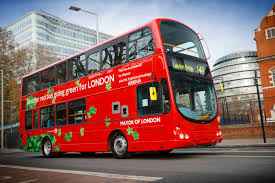London Hybrid Bus Now Allows Wireless Stationary Charging
- 22/11/2015
- Transport
- Posted by Darryn Van Hout
- Leave your thoughts
Business Green reports London’s public transport can now boost batteries wirelessly at bus stops.
As London’s green buses receives another boost, that is, the capability to be able to charge their batteries at bus stops, is currently being tested.
Four specially designed Alexander Dennis Enviro400H E400 buses have the diesel-electric hybrid engine, which will have the capability to be able to boost their batteries while at rest at bus stops that are specially provided with charging stations…all done wirelessly.
These 4 buses will operate next year, running the route on Stagecoach-operated Route 69 between the towns of Canning and Walthamstow bus stations. Both stations will have the inductive wireless charging equipment.
While no mention of fuel cost, pollution, and projected carbon emission were mentioned, this new technology is mentioned to allow these 4 buses to be able to operate for a significant period of time while in passenger service mode.
According to TfL, Transport for London, the buses have diesel that would function when battery power is low, which would only be on a very small amount of time, thus emissions would also be low. The trial for these 4 specially built buses is being financed by Zero Emissions Urban Bus System (Zeeus). At the same time, Zeeus also stands for introduction of zero-emission hydrogen buses, the addition of 800 hybrid buses, and a fleet of 6 pure electric buses.
TfL’s director, Mike Weston, mentioned that they are continuously working at ensuring that they would continue to deliver new technology that would genuinely benefit the environment. This new venture of being able to charge electric buses through the inductive charging technology is definitely a step closer to being able to offer cleaner double-deck buses on the streets of London.
On the other hand, IPPR, or the Institute for Public Policy Research, London’s thinktank, also published on the same week that other cities have failed considerably TfL’s method in tackling public transport. In fact, it has failed because the provisions led to increased fares, terrible bus services, and negative environmental impact.
With the study conducted by IPPR, the liberalization of bus provision showed that London has the best buses in UK, but the deregulation of buses outside of London has demonstrated a failure. In fact, the study also shows that the bus use outside of London decreased 32% since 1986, bus fare increased by 35% within the years of 1995 and 2013.
Will Straw, associate director of IPPR shares that the success of public bus transport in London is no accident. In fact, he says it is a great success. Unfortunately, for those living outside of London, there is something that has to be carefully looked at with all of the results from studies that show reasons why the commuting public do not prefer using public buses.
While London hybrid bus is getting much attention on a new test where wireless charging is going to be another feature, IPPR shows another side of UK’s public bus transportation that would show that not everything in the UK gets the same treatment and handling.

